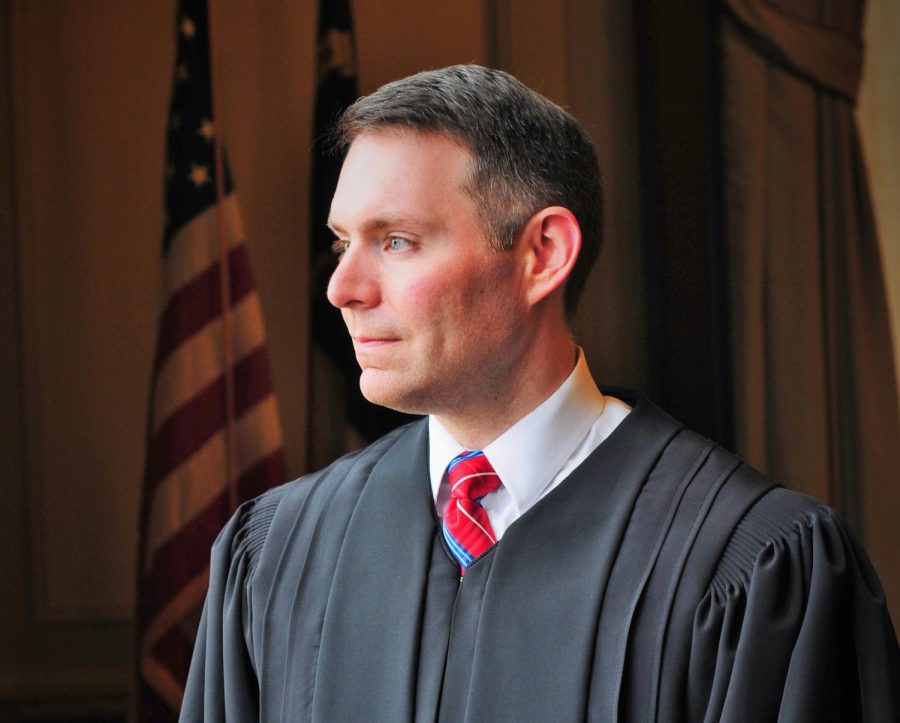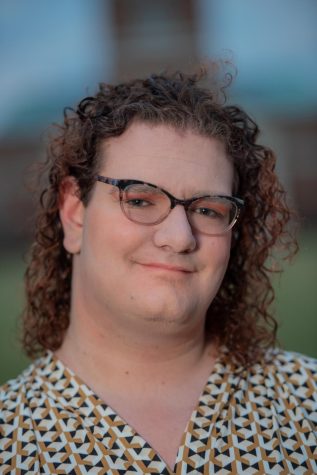WFU Law graduates on the NC Supreme Court: Richard Dietz
Since Dietz took office on Jan. 1, 2023, there are two Wake Forest Law School alumni on the court
Richard Dietz poses in his judge’s robes.
March 15, 2023
Associate Justice Richard Dietz, one of two Wake Forest Law School graduates on the seven-member North Carolina Supreme Court, believes Wake Forest is the “finest law school in the world.”
“There’s something about Wake Forest that does more than just train skilled lawyers…,” Dietz said in an address to the Wake Forest Law graduates of 2021. “We’re trained to be lawyers with heart.”
In his speech, Dietz goes on to share the story of one of his saddest moments. In the fall of his second year at law school, Dietz received a tearful phone call from his mother who told him that she had been diagnosed with terminal cancer. She told him to stay at law school, but he refused and went home to Pennsylvania.
“She wanted me to stay and focus on law school, and she promised that she’d call me every night,” Dietz said in the speech. “But I thought about it, and I just couldn’t do that. I mean, these were the last few weeks on Earth for my mother, and I was going to go home and be with her.”
Dietz believed this would be the end of his law school career — or, at least, that he would need to drop out and reapply. The deans of the law school told him to hold off and see what they could work out. A couple of days later, a cardboard box arrived at Dietz’s door, filled with VHS tapes of all the classes Dietz had missed, alongside photocopied notes. Boxes like these came every few days, Dietz said.
“One thing you’ll find is that law school can be pretty competitive…,” Dietz told me, giving me examples of students at other law schools tearing pages out of casebooks. “I was number one in my class at that time, and so … [at] a lot of law schools, what’s going through the minds of everyone is, ‘Oh, this is awesome. We’re going to take out the guy that’s number one, he’s gonna have to drop out. And then, you know, that’s one less person ahead of me in my class rank when I try to get a job or something.’”
Instead, at Wake Forest, “Everybody was like, ‘you know, whatever you need, Rich.’” Dietz told me that he watched the VHS tapes while he was at home with his mother. Dietz graduated first in his class a year and a half later.
Dietz went on to clerk for fellow Wake Forest law graduate H. Emory Widener, Jr. Eventually, Widener would become Dietz’s father-in-law.
“[Widener] actually introduced us,” Dietz said. “He said, ‘Oh, you know, I love Wake Forest. My daughter actually just graduated there, and she was waiting to go work on the Hill.’”
Five years later, Richard and Kelley Dietz walked out of Wait Chapel as a married couple — and right into a Hearn Plaza “quad roll.”
“It was the one year anniversary of [former Wake Forest basketball coach] Skip Prosser’s death, so the students, to honor him, had come out and they were rolling the Quad,” Dietz said. “So Kelley, my wife, went over to roll the Quad… you can’t find any more of a diehard Demon Deacon fan than that.”
Dietz says Wake Forest prepared him well to do one thing that many law schools do not teach — connect with clients.
“Being a lawyer is more than just… knowing the law and being able to research the law,” Dietz said. “You have to be able to talk to people, you need to get them to confide in you so you can figure out their case, and I think that’s something Wake [Forest] excels at.”
In 2014, Dietz was working at Kilpatrick Townsend & Stockton — an international law firm that handles international property law — when a spot on the North Carolina Court of Appeals opened.
“The only thing that I could ever imagine that would be cooler, as far as a profession, than being the person that gets to step up to that podium and argue in an appellate case for clients is to put on the robe and be the person on the other side that gets to ask the questions and decide the case,” Dietz said. “And so, and I think that’s for most appellate lawyers, it is kind of the dream that you can one day become an appellate judge.”
Dietz became a justice of the N.C. Supreme Court after defeating Democrat Lucy Inman in last November’s election. He could not talk specifics about cases due to the N.C. Supreme Court’s media policy (which is fairly standard), but said he and Phil Berger were inspired by their time at Wake Forest to create opportunities for high school students and undergraduates to access the law.
To accomplish this, Berger and Dietz plan to create similar programs at the N.C. Supreme Court to the ones they did on the Court of Appeals. Those programs began in 2020 — right after the world was shut down by the spread of COVID-19. First, Berger and Dietz helped create an appellate seminar for law students whose internships for that summer were canceled. Then, phones began to ring.
“After we did the law student seminar, it got all this media attention,” Dietz said. “And then parents reached out and — because [Berger] was campaigning [for the Supreme Court] at the time, I think they reached out to him and said, ‘Oh, we saw you doing this wonderful thing, but my high schooler is going crazy at home and really needs something like this. Can’t you do something?’”
Dietz continued: “Well, you can’t really do an appellate law seminar for you know, kids in high school. It’s too complicated. But, you know, I was like, why don’t we just do a constitutional academy and just give them a little certificate that you put on your resume?”
It remains to be seen what impact Dietz will have on the N.C. Supreme Court, but his desire to give back to the Wake Forest community is clear. After all, it was Wake Forest that trained him to be a lawyer with heart.















